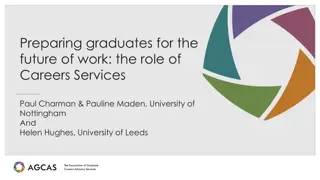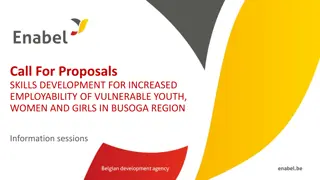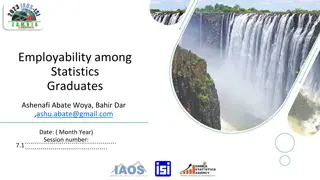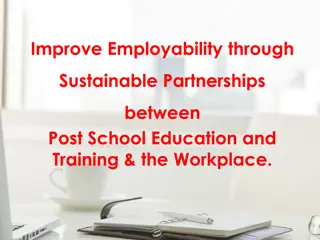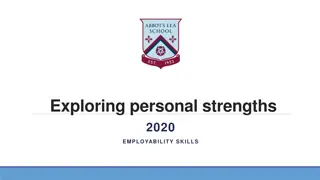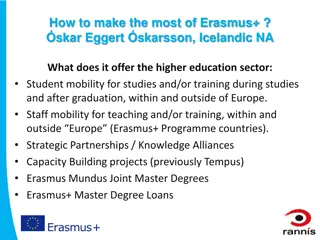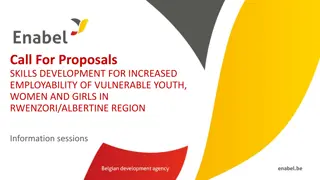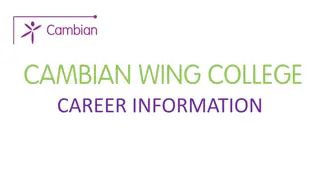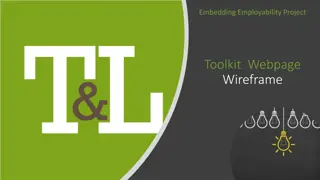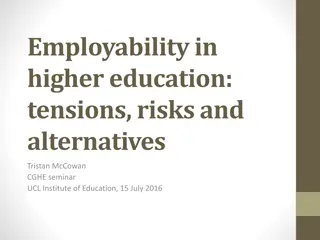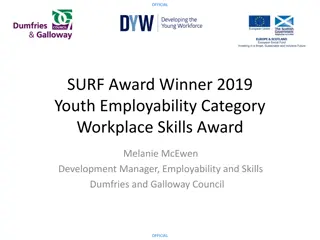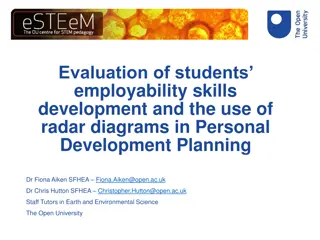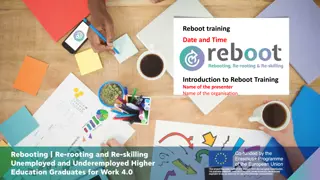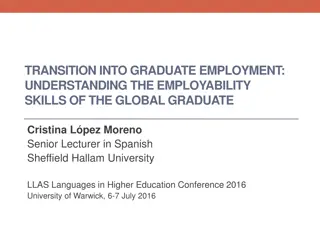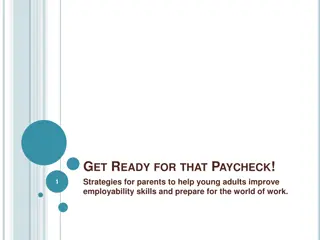Enhanced Access to Economic Opportunities and Employability: A Strategic Focus
This strategy outlines Priority Focus Area 7, aiming to provide improved access to economic opportunities and employability by enhancing skills, education, transport, and housing. The initiative seeks to create a thriving society where all citizens have better access to economic pathways, employment opportunities, and necessary skills for the future. Through a holistic and interconnected approach, the goal is to enable informed career choices, facilitate employment readiness, and promote entrepreneurship, ultimately transforming township economies and fostering economic growth.
Download Presentation

Please find below an Image/Link to download the presentation.
The content on the website is provided AS IS for your information and personal use only. It may not be sold, licensed, or shared on other websites without obtaining consent from the author. Download presentation by click this link. If you encounter any issues during the download, it is possible that the publisher has removed the file from their server.
E N D
Presentation Transcript
G4J Strategy Overview: Priority Focus Area 7: Improved Access to Economic Opportunities and Employability (skills and education, transport, housing, etc.) 13 July 2023
Outline PFA7 Overview Key Aspects of the WCED response Conclusion
PFA 7: Improved Access to Economic Opportunities and Employability Goal Objective A thriving society where capable, economically active All citizens who want to be economically active have improved ACCESS to economic opportunities and citizens are able to access economic opportunities and employability through at least ONE pathway, with employment, including the skills of the future, and where pathways comprising improved EMPLOYABILITY barriers to accessing information, to developing ASSETS (knowledge, skills, experience, and/or competencies and skills, and to finding work, have been competencies), reduced or removed. career management skills, workplace-ready capabilities and skills, economic opportunities more accessible to communities, and entrepreneurship.
Improved Access to Economic Opportunities and Employability Youth and the unemployed can make INFORMED CHOICES about their careers and future and are enabled to pursue their career pathways Citizens have easier access to economic opportunities and pathways nearer to the places that they live. A strong PIPELINE OF SUITABLY QUALIFIED PEOPLE who are employment- ready, able to access available jobs and be absorbed rapidly and sustainably into employment. Western Cape school leavers/graduates have a REPUTATION FOR TECHNICAL EXPERTISE coupled with and are highly sought after by employers INNOVATION/CREATIVITY/PROBLEM-SOLVING AND COLLABORATION SKILLS Picture of Success ENTREPRENEURSHIP is considered a viable choice as an economic opportunity and citizens starting up a business whether formal or informal have access to the necessary support and enabling environment Changing the view of TOWNSHIP ECONOMIES from latent informal business to potential value chain business or suppliers in specific sectors would open opportunities for township-based entrepreneurs to participate more favourably in industry value chains Townships are vibrant and dynamic economic places contributing to and benefitting from break-out economic growth
Theory of Change for Improved Access to Economic Opportunities and Employability
Current pathways WOMB - TOMB; HOME -WORK; LIVELIHOOD LIFE-JOY
G4J - 6 Themes and interventions fall along the path ( aim to enhance) 1. Improved education-based and competency-based pathways 3. Improved work- place skills and productivity pathways 2. Improved post-school and tertiary education partners 4. Bringing economic pathways and opportunities closer to citizens and communities and vice versa 5. Enhancing entrepreneurship pathways 6. Strategic Co-ordination and strengthened eco-systems
Improved Access to Economic Opportunities and Employability Themes & Interventions 1 2 Improved post-school and tertiary education partners (2) Investigating the feasibility and develop a strategy to expand the number of universities (private sector and public sector) and Technical Vocational Education and Training (TVET) colleges in the Western Cape Together with the tertiary institutions, enhancing the through-put rates of enrolled tertiary students Improved education-based and competency-based pathways (5) Improving life orientation content on careers, work-readiness and competencies Expanding after-school programme to develop competencies Revising curriculum and modes of learning to maximise relevance to the workplace- 3 Streams Accelerating the roll-out of focus schools and increase scale and geographic coverage of these schools In partnership with the private sector, rolling out online blended learning Bringing economic pathways and opportunities closer to citizens and communities and visa versa (8) Overcoming the digital divide devices, connectivity, and relevant learning content available and aby making ccessible to all learners Creating mixed-use, high density and compact settlements Developing a vibrant, functional housing market as well as a land assembly pipeline to promote affordable, better located, more integrated housing opportunities and access to housing ladder Work with municipalities to support homeowner-driven small scale development Improving public transport to reduce commuting times Developing an overall Western Cape township strategy as well as township action plans within targeted communities Considering whether programmes such as the WCG s Year Beyond Programme and EPWP can be used to assist skills transfer into township-based growth opportunities Improving urban management in townships to support investment, enabling the development of economic nodes and commercial activities 4 3 Improved work-place skills and productivity Pathways (7) Developing initiatives to enhance experiential learning, as well as knowledge exchange Exploring how the DEDAT s BPO work placement model can be replicated for growth opportunities Developing innovative models for micro-certification of modules from credible tertiary institutions rather than long-term accredited skills programmes. Working with the private sector re their hiring practices Strengthening dialogue between SMMEs and SETAs to increase funding to non-corporate businesses Forging closer relationships with the Presidential Employment Stimulus team and YES initiative to better leverage and reorientate these support packages Championing and investing in programmes to deliver digital skills relevant to the workplace at scale (see Tech and Innovation PFA).
Improved Access to Economic Opportunities and Employability Themes & Interventions 5 6 Enhancing entrepreneurship pathways ( 8) Strategic Co-ordination and strengthened eco- systems (2) Increasing economic IQ about learning, schools, entrepreneurship, and microbusiness, providing open data Strengthening the learning ecosystem and forums of learning institutions to support relevant learning Understanding the impact of compliance enforcement on local businesses, and develop more incremental, affordable, and empowering systems where necessary. Leveraging existing digital entrepreneurial platforms to provide support to entrepreneurs, providing information and a community of guidance to start-ups and those who want to expand. Supporting opportunities for microbusiness support for women Identifying and address challenges and ease of doing business, including the concerns about crime and safety, within the environment for entrepreneurs/microbusiness Developing campaigns to promote entrepreneurship and microbusiness. Conducting an international benchmarking of South Africa s labour legislation and regulations, as well as assist business compliance with respect to labour relations regulations. Supporting the entrepreneurship pathway from skills (business skills) to SMME support, to SMME development through supplier development in the public and private sector Developing school-based collaborative programmes with private sector that supports youth start-up businesses
Improved Access to Economic Opportunities - Flagship projects for 2023/24
Improved Access to Economic Opportunities - Projects for 2023/24 PFA Theme Interventions Projects 1 PFA: Employability Improved education- based and competency-based pathways Improving life orientation content on careers, work-readiness and competencies 1. Career Clubs in Schools 1 Projects 4 No PFA Theme PFA: Employability Improved work-place skills and productivity pathways 1. ED Support: Labour Relations Compliance 2. Growth through experiential learning & jobs Clothing & Textiles 3. Improved work-place skills and productivity pathways BPO 4. Three Streams Model 9. Exploring how the DEDAT s BPO work placement model can be replicated for growth opportunities that are currently constrained by skills shortages The implementation of Year 1 Project plans will speed up after the approval of the Implementation Plan in June. Project plans for Year 2 will be submitted in the next phase
DEDATs Skills Strategy in Support of PFA 7 In the Long-Term actively pursue a strategy that negates the need for a DEDAT skills priority. In the medium term develop curricula/training modalities that negates the need for DEDAT post school intervention. In the short-term support growth through improvements in labour productivity, fulltime employment and support demand through a supply-side instrument. Our strategy is G4J - experiential learning is the most direct manner in delivering jobs. Immediate Impact: Experiential Learning Programmes Long-term & Systemic: Ecosystem alignment Medium Term: Curricula alignment Strategic strengthened eco-systems A self-correcting sensitive and responsive to changing industry demands. Expand public and private education institutional offerings aligned to industry skills needs - support public TVET dual Extensive work with basic and higher education to bring about alignment between industry and academia Align funding windows, areas of funding and funding requirements changing industry requirements. Develop and institutional responsive structures Co-ordination and Improve education-based and post school education pathways Introduce new and/or refine curricula and training modalities across higher education and basic education more suited to ever demands. New modalities in delivering curricula including new modalities (reach and scale) CBMT in Schools partnership with private sector and WCED THS learners gain more practical skills employability. SETA support for STEAMAC (pilot of 3 year support from FoodBev SETA). Improve workplace skills and productive pathways Replicate the BPO workplace model to other sectors Transitioned more than 5000 unemployed youth into employment via experiential learning. . of which 80% of beneficiaries who complete their experiential learning will be transitioned into fulltime employment. Crowd in more than R500m in financial support. R360m increase in household income Explore on the job training and non- accredited training employment (NEETS) skills ecosystem changing industry delivery (digital with to improve support that lends to
DEDATs Entrepreneurship Promotion in Support of G4J Context: Entrepreneurship, like capital, is a critical factor of production Our Response: Realise & accept that the economy and entrepreneurship is critical for our prosperity Let's do this together - all 3 spheres of gov & agencies, tertiary education, private sector, support organisations SA problem: LOW start-up rate of new businesses and HIGH failure rate of existing businesses Some key inhibiting factors: A not-so-encouraging entrepreneurship culture in communities Selected key thrusts: Regulatory reform and reduction of government bureaucracy (Red Tape Reduction Programme) Not an option for young people, Get a job . Province and district-wide entrepreneurship promotion (e.g., events, workshops, training) Inadequate support (financial and non-financial) eco-system . both in terms of business stage of development (e.g., start-up) and geographical distribution (urban vs rural) Supplier development (public sector local suppliers) Private & public sector business opportunity linkages Poor levels of education and training School and post-school entrepreneurship promotion & development Red tape and government bureaucracy - regulatory constraints (e.g., rigid labour laws) Township and informal business support Availability of technical and industry-specific training (e.g., artisans becoming entrepreneurs) Women, start-ups & youth as key themes
DEDATs Township Growth in Support of G4J Context: Need to include those excluded from the economy because of e.g. (lack of) skills & income, geography Our Response: Finalisation of a township economic growth strategy (TEGS) Rationale for supporting township & informal sector Selection of about 2 pilot sites for implementation Historical and existing social deprivation with concomitant unemployment, poverty & feelings of hopelessness Key thrusts: Spatial Planning Regulatory reform Enterprise development & business support Infrastructure (social and economic) Means to address challenge of urbanisation and in-migration Skills development and training Crime (and extortion) Technology and innovation Potential enormous economic opportunities to contribute significantly to the mainstream economy
WCED response overview 1. The WCED has welcomed and embraced its dedicated inclusion in the WCG Economic Development Planning process G4J. It provides the opportunity to enhance the WCG work done before in the Skills De elopement pipeline to strengthen the relationship between SCHOOLS , TERTIARY EDUCATION, WORLD of WORK, and SOCIETY Schools can become more responsive developing better readiness for TERTIARY EDUCATION, WORLD OF WORK and CITIZENSHIP roles The WCED has received presentations from G4J Seco, made inputs to the development of the Strategy, allocated officials to this and other PFAs, and included the work in the Performance Agreements of relevant officials 2. The WCED is appreciative of being made the PFA lead department for PFA 7 and to work with all the WCG Departments on the initiative as a whole and in the PFA specifically. Through this, the intervention on Career Awareness has acquired an inter-departmental and whole of society platform that can lead substantially increased awareness and choice-making The 3 Streams model ( Academic, Technical and Vocational) can be enhanced through a wider set of partnerships within WCG and across private and community sectors.
FLAGSHIP 1: Life Orientation Establish Career clubs in all schools Outcomes: Learners that are self- confident; have good self-esteem and understands his/her interests and abilities. Learners that have a full understanding of the career landscape. Well-informed learners that are enabled to make confident career choices. Learners that understand the entrepreneurial mindset.
Career Research WHO AM I? Strengths, Abilities & Interests Career Expos; Workplace exposure & excursions CAREER CLUB ACTIVITIES PBL develops entrepreneurial mindset Invite speakers Learner led sessions
APP Targets 3 Streams - Emergent Policy Implementation aiming to increase access learning pathways OCCUPATIONAL - preparing learners for the workplace VOCATIONAL Broadly aligned to a vocation ; Both ordinary and Focus ACADEMIC ( 97%) General, formative, well- rounded Post School Education & Training studies Focus Schools such as Technical, Agricultural, and Art high schools SoS etc Outcome Outcome Indicator Baseline 2018/19 6% Five target 12% Year Increase Agricultural, Vocational and Skills subjects and schools access to Technical, Percentage of learners who offer at least one subject in the technical, agricultural, vocational and skills fields.
3/23/2024 WCED approach 3 Streams FOCUS SCHOOLS (30) Tech/SoS 26 Tech + 26 SoS 10 Subjects-FET; 13 Subjects- GET E3(Entre/Empl /Educ) Pilot 550 schools 7 MST, 3 X BCM, 3 X Agric, 4 X Engineering, 3 X ICT, 5 X Arts, 2 X Maritime and Marine, 3 x Service)
List of Current Technical schools in WC Education District Metro Central Metro Central Metro Central Metro East Metro East Metro East Metro East Metro East Metro East Metro North Metro North Metro North School Name Intshukumo SS Oude Molen THS Spes Bona THS Joe Slovo Engineering Kuils River THS Northpine THS Sizimisele THS Bellville HS Bellville THS Delft THS Kasselsvlei Comp HS Proteus THS Education District School Name 1 14 Metro South Oval North SS 2 15 Metro South Wynberg Boys High 3 16 Metro South Princeton SS 4 17 Eden - Central Karoo Beaufort West SS 5 18 Eden - Central Karoo Langenhoven Gymnasium 6 19 Eden - Central Karoo Morester SS 7 20 Eden - Central Karoo Eden THS 8 21 Cape Winelands Drostdy THS 9 22 Cape Winelands Esselenpark SS 10 23 Cape Winelands Labori THS 11 24 Cape Winelands Jakes Gerwel THS 12 25 Overberg Groenberg SS 13 Metro North St. Andrew's THS 26 West Coast Weston SS
What is a School of Skills (SoS? Learners who are unable to cope with the curriculum offered at public ordinary schools and who need an alternative adapted curriculum, are enrolled at a School of Skills. In the Western Cape, the Schools of Skill are special schools. They offer a learning pathway that equips learners with the relevant skills to join the world of work. Schools are encouraged to have a 4th year school-to-work programme. They establish links with industry and place learners with host companies for workplace exposure in the hope that they will offer learners full-time employment upon completing their programme. We need industry to open their doors for School of Skills learners to do job- shadowing and gain workplace exposure. We also need companies to link with our schools and provide job opportunities to our learners.
Schools of Skill in the Western Cape . Metro South Metro Central Metro East Metro North Cafda (Retreat) Batavia (Lansdowne) Axios (Faure) Lathitha (Khayelitsha) Westcliff (Bellville) Bet-El (Kuilsriver) De Grendel (Milnerton) Bishops (Bishop Lavis) Florida Ruyterwacht Atlantis Siviwe (Gugulethu) Mitchell s Plain Silverstream (Manenberg)
Schools of Skill in the Western Cape (continued) West Coast Cape Winelands Overberg Eden & Central Karoo Van Kervel (George) West Coast (Saldanha) Paarl Steinthal (Tulbagh) Nuwe-Hoop unit (Worcester) Wellington Breede Valley (Worcester) Jakes Gerwel Technical (Bonnievale) Agulhas (Napier) Riebeeck Valley Special School (Riebeek-West) Olympia (George) Oudtshoorn Graafwater
How to plug in? To take all of this forward more detailed discussion and is needed HOW? 1. The transversal work across government departments can be strengthened Implementation in districts and municipalities 2. Private sector and entities ( SETAs etc) can indicate where support can be committed
Thank you TMS Chase
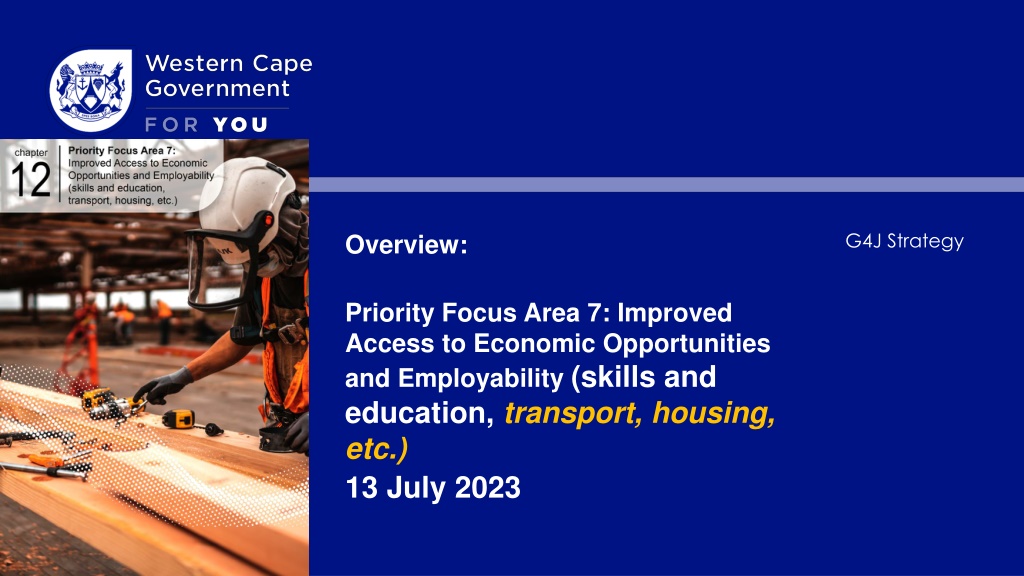
 undefined
undefined




